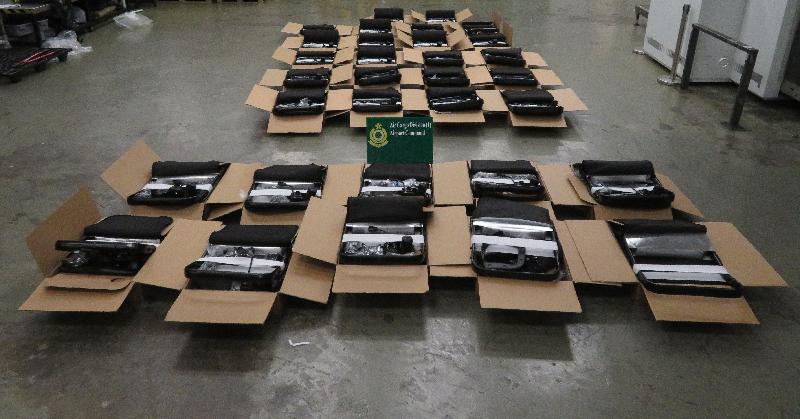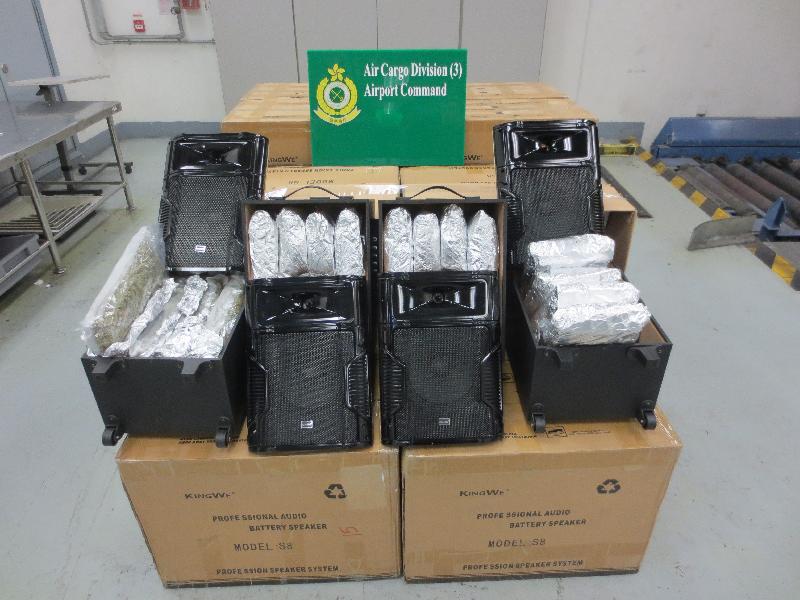Hong Kong Customs stepped up enforcement at Hong Kong International Airport from January to June this year to combat smuggling of dangerous drugs through air cargo and air passenger channels in view of the coronavirus disease 2019 epidemic. A total of 409 dangerous drug cases were detected and more than 1.6 tonnes of suspected dangerous drugs with a market value of over $660 million were seized. The drug seizure amount has surpassed the total yearly seizure of last year by 18 per cent and at the same time broke the record of the past decade when counting the amount in the first half of the year.
During the period, the number of dangerous drug cases detected, the amount of dangerous drugs seized and the market value have shown a substantial increase of 35 per cent, 1.15-fold and 1.7-fold respectively when compared with the same period in 2019. Major seizures in quantity order were cocaine (268 kilograms), methamphetamine (203kg), ketamine (203kg) and cannabis (126kg).
Regarding the passenger channel, a total of 36 dangerous drug cases were detected in the first half of this year, and 131kg of suspected dangerous drugs worth about $110 million were seized. The seizure amount has surpassed the total of the first half of last year by 21 per cent and has reached 51 per cent of last year's total seizure amount. Among these seizures, the amount of cocaine was the largest at 55kg.
Regarding the cargo channel, a total of 373 cases were detected in the first half of this year, which is a 37 per cent increase as compared to the figure for the same period last year. Dangerous drugs weighing 1.5 tonnes with a market value of about $550 million were seized, representing a 1.3-fold and 2.3-fold increase respectively when compared to the same period of last year. The seizure amount has also reached 1.3-fold of last year's total seizure amount, representing a substantial increase. Among these seizures, the amount of cocaine was the largest at 213kg.
Among the cases detected from the cargo channel, a significant increase has been observed in the express parcel channel. Among the 193 cases detected, a total of 468kg of different kinds of dangerous drugs with a market value of about $298 million were seized, marking a 3.6-fold increase as compared to the same period of last year. Thirty-one cases were detected in general cargo with a seizure amount of 791kg, which also marked a two-fold increase as compared to the same period of last year. As for cases effected from the postal channel, a decrease of 24 per cent to 149 cases was recorded.
Customs believes that drug trafficking syndicates have switched their smuggling route to the air cargo channel (including general cargo, postal parcel and express courier) as a result of the massive cancellation of passenger flights.
Among the cases detected at the airport, 79 persons aged between 17 and 72, including masterminds of drug trafficking syndicates, were arrested.
The Group Head (Air Cargo Group) of Airport Command, Mr Lau Ching-lung, and the Group Head (Airport Investigation) of Customs Drug Investigation Bureau, Mr Lee Man-lok, today (July 22) reiterated at a press conference that Customs has all along striven to intercept the inflow of drugs to Hong Kong by adopting a risk management and intelligence-led approach according to the trends in the drug market and smuggling channels.
Despite the ever-changing concealment methods adopted by drug traffickers, an enormous seizure amount in the first half of this year has been recorded. This reflects the fruitful results achieved by a targeted strategy against drug trafficking activities. The department will continue to make necessary adjustments in deployments in accordance with changes during the epidemic.
Customs will also introduce advanced artificial intelligence-assisted CT scanners to help detect different kinds of dangerous drugs.
Customs reminds members of the public not to release their personal data or address to others for receiving mail or goods to avoid having their information used in illegal activities. The public also should not receive mail and goods for others.
Under the Dangerous Drugs Ordinance, trafficking in a dangerous drug is a serious offence. The maximum penalty upon conviction is a fine of $5 million and life imprisonment.
Follow this news feed: East Asia









